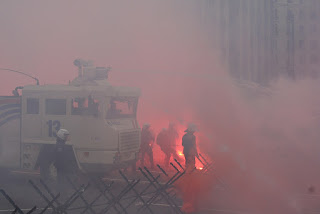 |
| Europe's police are under pressure |
The head of all Europe's police unions and associations is Danish, but married a Cumbrian and lives in the Southern Lake District.
At a public hearing in the European Parliament on the fight against terrorism, the first questioner insisted that “We need to define what terrorism is so we can fight it better.”
Almost fifteen years after 9/11 there is no definition of what terrorism is, but law enforcement have to deal with the real world practicalities of responding to the terror threat.
Europe’s police have a major obstacle that is affecting their ability to protect the public: Austerity.
Cuts in police budgets are causing serious problems and are not being addressed, Anna Nellberg-Dennis, President of the European Confederation of Police, Eurocop told the parliament.
Representing half a million police in 25 EU countries, Nellberg-Dennis explained why police were such a vital part of any anti-terror strategy, “It is important to remember that, as we have seen with the incidents earlier this year, it is the police officers on our streets who run towards terrorist attacks when all others are running away.”
Because of this, “It is therefore essential that they are provided with the appropriate support, training and resources needed to carry out their duties.”
She continued, “It would be reasonable to expect an adjustment in police budgets to ensure that police officers have the skills and equipment to tackle the fight against terrorism, and yet police budgets have been cut for several years.”
However, this is not the case and may not be for some time. “This may result in failure to maintain their current equipment but in the worst cases, uniforms, weapons, ammunition, computers vehicles, even fuel for police fleets can no longer be replaced or supplied.”
She added, “All of these are basic items that are essential before police officers can even begin thinking about combating the terrorist threat in Europe.”
Another area of grave concern was training. “Training has also been reduced significantly for police officers despite the need for them to expand their skills to fight new terrorist threats.”
Stressing that this wasn’t just an interest group asking for more money, Nellberg-Dennis said the cuts were affecting not only national security for member states, but the internal security of the whole of Europe.
“Let me give you one example,” she said, “In Spain, the Guardia Civil will see a 40% cut in trained members of its GEDEX units (Deactivation of Explosives Special Unit). This means that there is less capacity to trace and deactivate explosive devices used by terrorists, such as car bombs, grenade and letter bombs in Spain, one of the gateways to Europe.”
A weakness in one country, is a weakness for all of Europe.
The Police representative said that whilst the extent of austerity measures is a nationalcompetence she said a review was needed on the effect of cuts on the EU’s internal security.
Strength in one country can be strength for all of Europe. “We need to further enhance cross-border police cooperation. She elaborated, “For example, in preventing or investigating terrorist incidents, obtaining relevant information from across EU Member States, quickly, and at the time when it is needed is essential.”
Saying the current system was working “reasonably well,” she said there was significant room for improvement. “Systems should for instance be able to be easily integrated within national processes and IT infrastructures, and the development of existing tools, enhancing their efficiency, should take priority over the development of new tools.”
She also said that “information sharing has to become quicker and needs to be delivered in a more comprehensive way at the European level.”
What do Europe’s police want from Europe? “Recognition by EU and national policymakers that new internal security policy frameworks ensure that police officers are provided with the adequate resources, training and equipment to fight terrorism.
Move Europe closer to a common culture for law enforcement. This should for instance be reflected in the European Agenda on Security and supported by a number of concrete proposed measures or best practices, in areas such as training, information-sharing, implementation of laws etc.”
As Churchill might say, ‘If you gave us the job, give us the tools.’

No comments:
Post a Comment